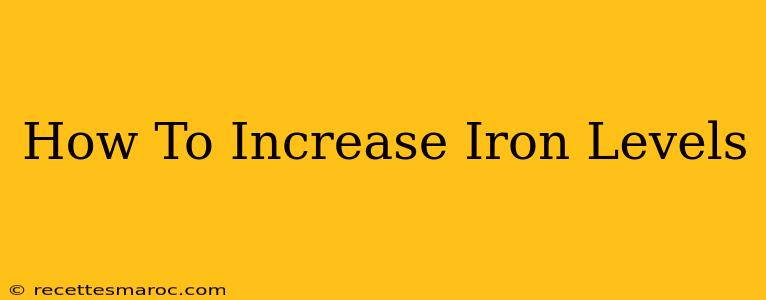Iron is a vital mineral that plays a crucial role in numerous bodily functions, including oxygen transport, energy production, and immune function. Iron deficiency, or anemia, can lead to fatigue, weakness, and other health problems. This comprehensive guide explores natural ways to increase your iron levels and improve your overall well-being.
Understanding Iron Deficiency
Before diving into solutions, it's important to understand why you might be deficient. Common causes include:
- Insufficient dietary intake: Not consuming enough iron-rich foods.
- Poor iron absorption: Certain medical conditions or medications can hinder the body's ability to absorb iron.
- Blood loss: Heavy menstrual bleeding, internal bleeding, or gastrointestinal issues can contribute to iron deficiency.
Note: If you suspect you have iron deficiency, consult a doctor for proper diagnosis and personalized advice. Self-treating can be risky.
Boosting Iron Levels Naturally: Food is Your Friend!
The most effective way to increase iron levels is through a well-balanced diet rich in iron-containing foods. Here's a breakdown of excellent sources:
Heme Iron (Easily Absorbed):
- Red meat: Steak, beef liver, and other red meats are excellent sources of heme iron, the most easily absorbed form.
- Poultry: Dark meat chicken and turkey also provide heme iron.
Non-Heme Iron (Absorption can be improved):
- Leafy green vegetables: Spinach, kale, and collard greens are packed with non-heme iron.
- Legumes: Lentils, beans, and chickpeas are good sources of plant-based iron.
- Tofu: A soy-based protein source that offers a decent amount of iron.
- Dried fruits: Raisins, apricots, and prunes are surprisingly high in iron.
- Fortified foods: Cereals, breads, and other processed foods are often fortified with iron. Check the nutrition labels.
Tip: Consuming foods rich in Vitamin C alongside non-heme iron sources significantly enhances absorption. Think of a spinach salad with oranges or a lentil soup with a squeeze of lemon juice.
Lifestyle Changes for Better Iron Absorption
In addition to diet, certain lifestyle choices can influence your body's ability to absorb iron:
- Avoid coffee and tea with meals: These beverages contain compounds that can inhibit iron absorption.
- Limit phytate intake: Phytates, found in grains and legumes, can also interfere with iron absorption. Soaking or sprouting grains and legumes can reduce phytate levels.
- Manage stress: Chronic stress can negatively impact iron absorption and overall health. Incorporate stress-reducing techniques like yoga, meditation, or spending time in nature.
- Regular exercise: Moderate exercise supports overall health and can indirectly improve iron levels by boosting blood circulation.
Supplements: When to Consider Them
While a healthy diet is usually sufficient, your doctor might recommend iron supplements if your deficiency is severe or if your diet alone isn't enough to improve your iron levels. Never take iron supplements without consulting a doctor first, as excessive iron intake can be harmful.
Monitoring Your Progress
Regular blood tests are essential to monitor your iron levels and ensure the effectiveness of your efforts. Your doctor can guide you on the appropriate frequency of testing.
Conclusion
Increasing your iron levels naturally is achievable through a combination of dietary adjustments, lifestyle changes, and, if necessary, supplementation under medical supervision. By prioritizing iron-rich foods and adopting healthy habits, you can support your overall health and well-being and combat iron deficiency effectively. Remember to consult your healthcare provider for personalized advice and to rule out any underlying medical conditions.

